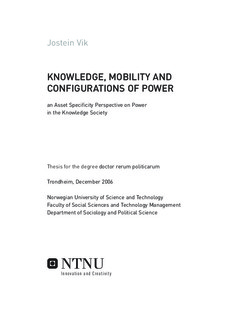Knowledge, Mobility and Configurations of Power: an Asset Specificity Perspective on Power in the Knowledge Society
Doctoral thesis
Permanent lenke
http://hdl.handle.net/11250/265033Utgivelsesdato
2006Metadata
Vis full innførselSamlinger
Sammendrag
This dissertation studies three interrelated concepts—power, knowledge, and mobility—in order to understand how knowledge mobility (specificity) affects power in the knowledge economy. To do this, the thesis is divided into two parts. The first part develops a theoretical approach, while the second employs this theoretical approach to different empirical fields. In the first, theoretical, part, the dissertation begins by discussing the different ways that the sundry literatures on power, asset specificity and knowledge types have developed. These literature reviews are used to develop a set of theoretically-deduced expectations in Chapter 5. These chapters contribute to broadening our understanding of the core concepts, especially asset and factor specificity, by explicitly linking them to the notion of knowledge mobility and to configurations of power.
The second part of the dissertation interrogates the expectations developed in Chapter 5 across three different venues: a case study of a regime change in a knowledge-intensive consultancy firm; cross-national multivariate statistical assessments on the relationship between specificity, knowledge, and configurations of power; and an historical case study of how the co-working of a set of international institutions—the World Intellectual Property Organization, the International Organization for Standardization, and the World Trade Organization—influences knowledge specificity and mobility. These empirical studies elaborate how knowledge mobility and power are interrelated. The chapters are suggesting that the degree of knowledge mobility may be seen as an element in otherwise well-known, empirical regularities. These sorts of similarities are revealed at all three (firm, national and international) levels.
The dissertation employs a broad methodological approach that swaps between analytical levels, alternative operationalizations, methods and causal interpretations. The resulting "montage effect" combines case studies, multivariate regressions, and institutional analyses to create a picture that may be seen as rich representation of a reality. This picture reveals that the specificity and mobility of assets matters for shaping and reshaping configurations of power.
